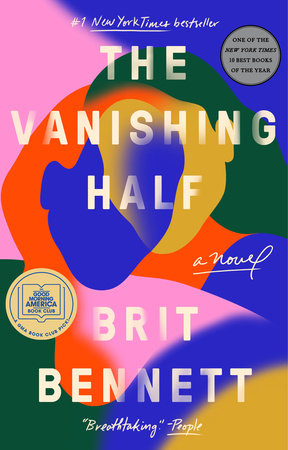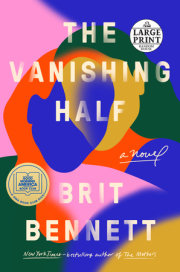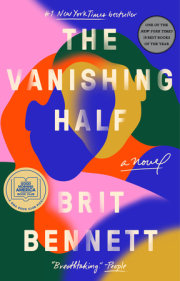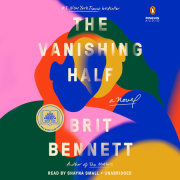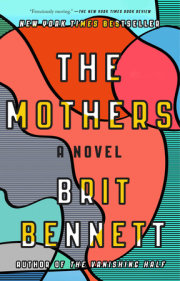One
The morning one of the lost twins returned to Mallard, Lou LeBon ran to the diner to break the news, and even now, many years later, everyone remembers the shock of sweaty Lou pushing through the glass doors, chest heaving, neckline darkened with his own effort. The barely awake customers clamored around him, ten or so, although more would lie and say that they'd been there too, if only to pretend that this once, they'd witnessed something truly exciting. In that little farm town, nothing surprising ever happened, not since the Vignes twins had disappeared. But that morning in April 1968, on his way to work, Lou spotted Desiree Vignes walking along Partridge Road, carrying a small leather suitcase. She looked exactly the same as when she'd left at sixteen-still light, her skin the color of sand barely wet. Her hipless body reminding him of a branch caught in a strong breeze. She was hurrying, her head bent, and-Lou paused here, a bit of a showman-she was holding the hand of a girl, eight or so, and black as tar.
"Blueblack," he said. "Like she flown direct from Africa."
Lou's Egg House splintered into a dozen different conversations. The line cook wondered if it had been Desiree after all, since Lou was turning sixty in May and still too vain to wear his eyeglasses. The waitress said that it had to be-even a blind man could spot a Vignes girl and it certainly couldn't have been that other one. The diners, abandoning grits and eggs on the counter, didn't care about that Vignes foolishness-who on earth was the dark child? Could she possibly be Desiree's?
"Well, who else's could it be?" Lou said. He grabbed a handful of napkins from the dispenser, dabbing his damp forehead.
"Maybe it's an orphan that got took in."
"I just don't see how nothin that black coulda come out Desiree."
"Desiree seem like the type to take in no orphan to you?"
Of course she didn't. She was a selfish girl. If they remembered anything about Desiree, it was that and most didn't recall much more. The twins had been gone fourteen years, nearly as long as anyone had ever known them. Vanished from bed after the Founder's Day dance, while their mother slept right down the hall. One morning, the twins crowded in front of their bathroom mirror, four identical girls fussing with their hair. The next, the bed was empty, the covers pulled back like any other day, taut when Stella made it, crumpled when Desiree did. The town spent all morning searching for them, calling their names through the woods, wondering stupidly if they had been taken. Their disappearance seemed as sudden as the rapture, all of Mallard the sinners left behind.
Naturally, the truth was neither sinister nor mystical; the twins soon surfaced in New Orleans, selfish girls running from responsibility. They wouldn't stay away long. City living would tire them out. They'd run out of money and gall and come sniffling back to their mother's porch. But they never returned again. Instead, after a year, the twins scattered, their lives splitting as evenly as their shared egg. Stella became white and Desiree married the darkest man she could find.
Now she was back, Lord knows why. Homesick, maybe. Missing her mother after all those years or wanting to flaunt that dark daughter of hers. In Mallard, nobody married dark. Nobody left either, but Desiree had already done that. Marrying a dark man and dragging his blueblack child all over town was one step too far.
In Lou's Egg House, the crowd dissolved, the line cook snapping on his hairnet, the waitress counting nickels on the table, men in coveralls gulping coffee before heading out to the refinery. Lou leaned against the smudged window, staring out at the road. He ought to call Adele Vignes. Didn't seem right for her to be ambushed by her own daughter, not after everything she'd already been through. Now Desiree and that dark child. Lord. He reached for the phone.
"You think they fixin to stay?" the line cook asked.
"Who knows? She sure seem in a hurry though," Lou said. "Wonder what she hurryin to. Look might past me, didn't wave or nothin."
"Uppity. And what reason she got to be uppity?"
"Lord," Lou said. "I never seen a child that black before."
It was a strange town.
Mallard, named after the ring-necked ducks living in the rice fields and marshes. A town that, like any other, was more idea than place. The idea arrived to Alphonse Decuir in 1848, as he stood in the sugarcane fields he'd inherited from the father who'd once owned him. The father now dead, the now-freed son wished to build something on those acres of land that would last for centuries to come. A town for men like him, who would never be accepted as white but refused to be treated like Negroes. A third place. His mother, rest her soul, had hated his lightness; when he was a boy, she'd shoved him under the sun, begging him to darken. Maybe that's what made him first dream of the town. Lightness, like anything inherited at great cost, was a lonely gift. He'd married a mulatto even lighter than himself. She was pregnant then with their first child, and he imagined his children's children's children, lighter still, like a cup of coffee steadily diluted with cream. A more perfect Negro. Each generation lighter than the one before.
Soon others came. Soon idea and place became inseparable, and Mallard carried throughout the rest of St. Landry Parish. Colored people whispered about it, wondered about it. White people couldn't believe it even existed. When St. Catherine's was built in 1938, the diocese sent over a young priest from Dublin who arrived certain that he was lost. Didn't the bishop tell him that Mallard was a colored town? Well, who were these people walking about? Fair and blonde and redheaded, the darkest ones no swarthier than a Greek? Was this who counted for colored in America, who whites wanted to keep separate? Well, how could they ever tell the difference?
By the time the Vignes twins were born, Alphonse Decuir was dead, long gone. But his great-great-great-granddaughters inherited his legacy, whether they wanted to or not. Even Desiree, who complained before every Founder's Day picnic, who rolled her eyes when the founder was mentioned in school, as if none of that business had anything to do with her. This would stick after the twins disappeared. How Desiree never wanted to be a part of the town that was her birthright. How she felt that you could flick away history like shrugging a hand off your shoulder. You can escape a town, but you cannot escape blood. Somehow, the Vignes twins believed themselves capable of both.
And yet, if Alphonse Decuir could have strolled through the town he'd once imagined, he would have been thrilled by the sight of his great-great-great-granddaughters. Twin girls, creamy skin, hazel eyes, wavy hair. He would have marveled at them. For the child to be a little more perfect than the parents. What could be more wonderful than that?
The Vignes twins vanished on August 14, 1954, right after the Founder's Day dance, which, everyone realized later, had been their plan all along. Stella, the clever one, would have predicted that the town would be distracted. Sun-drunk from the long barbecue in the town square, where Willie Lee, the butcher, smoked racks of ribs and brisket and hot links. Then the speech by Mayor Fontenot, Father Cavanaugh blessing the food, the children already fidgety, picking flecks of crispy chicken skin from plates held by praying parents. A long afternoon of celebration while the band played, the night ending in a dance in the school gymnasium, where the grown folks stumbled home after too many cups of Trinity Thierry's rum punch, the few hours back in that gym pulling them tenderly toward their younger selves.
On any other night, Sal Delafosse might have peeked out his window to see two girls walking under moonlight. Adele Vignes would have heard the floorboards creak. Even Lou LeBon, closing down the diner, might have seen the twins through the foggy glass panes. But on Founder's Day, Lou's Egg House closed early. Sal, feeling suddenly spry, rocked to sleep with his wife. Adele snored through her cups of rum punch, dreaming of dancing with her husband at homecoming. No one saw the twins sneak out, exactly how they'd intended.
The idea hadn't been Stella's at all-during that final summer, it was Desiree who'd decided to run away after the picnic. Which should not have been surprising, perhaps. Hadn't she, for years, told anyone who would listen that she couldn't wait to leave Mallard? Mostly she'd told Stella, who indulged her with the patience of a girl long used to hearing delusions. To Stella, leaving Mallard seemed as fantastical as flying to China. Technically possible, but that didn't mean that she could ever imagine herself doing it. But Desiree had always fantasized about life outside of this little farm town. When the twins saw Roman Holiday at the nickel theater in Opelousas, she'd barely been able to hear the dialogue over the other colored kids in the balcony, rowdy and bored, tossing popcorn at the white people sitting below. But she'd pressed against the railing, transfixed, imagining herself gliding above the clouds to some far-off place like Paris or Rome. She'd never even been to New Orleans, only two hours away.
"Only thing waitin for you out there is wildness," her mother always said, which of course, only made Desiree want to go even more. The twins knew a girl named Farrah Thibodeaux who, a year ago, had fled to the city and it sounded so simple. How hard could leaving be if Farrah, one year older than they, had done it? Desiree imagined herself escaping into the city and becoming an actress. She'd only starred in one play in her life-Romeo and Juliet in ninth grade-but when she'd taken center stage, she'd felt, for a second, that maybe Mallard wasn't the dullest town in America. Her classmates cheering for her, Stella receding into the darkness of the gym, Desiree feeling like only herself for once, not a twin, not one half of an incomplete pair. But the next year, she'd lost the role of Viola in Twelfth Night to the mayor's daughter, after her father had made a last-second donation to the school, and after an evening sulking in the stage wing as Mary Lou Fontenot beamed and waved to the crowd, she told her sister that she could not wait to leave Mallard.
"You always say that," Stella said.
"Because it's always true."
But it wasn't, not really. She didn't hate Mallard as much as she felt trapped by its smallness. She'd trampled the same dirt roads her entire life; she'd carved her initials on the bottom of school desks that her mother had once used, and that her children would someday, feeling her jagged scratching with their fingers. And the school was in the same building it'd always been, all the grades together, so that even moving up to Mallard High hadn't felt like a progression at all, just a step across the hallway. Maybe she would have been able to endure all this if it weren't for everyone's obsession with lightness. Syl Guillory and Jack Richard arguing in the barber shop about whose wife was fairer, or her mother yelling after her to always wear a hat, or people believing ridiculous things, like drinking coffee or eating chocolate while pregnant might turn a baby dark. Her father had been so light that, on a cold morning, she could turn his arm over to see the blue of his veins. But none of that mattered when the white men came for him, so how could she care about lightness after that?
She barely remembered him now; it scared her a little. Life before he died seemed like only a story she'd been told. A time when her mother hadn't risen at dawn to ride buses clean to white people's houses or taken in extra washing on the weekends, clotheslines zigzagging across their living room. The twins used to love hiding behind the quilts and sheets before Desiree realized how humiliating it was, your home always filled with strangers' dirty things.
"If it was true, then you'd do something about it," Stella said.
She was always so practical. On Sunday nights, Stella ironed her clothes for the entire week, unlike Desiree, who rushed around each morning to find a clean dress and finish the homework crushed in the bottom of her book bag. Stella liked school. She'd earned top marks in arithmetic since kindergarten, and during her sophomore year, Mrs. Belton even allowed her to teach a few classes to the younger grades. She'd given Stella a worn calculus textbook from her own Spelman days, and for weeks, Stella lay in bed trying to decipher the odd shapes and long strings of numbers nestled in parentheses. Once, Desiree flipped through the book, but the equations spanned like an ancient language and Stella snatched the book back, as if by looking at it, Desiree had sullied it somehow.
Stella wanted to become a schoolteacher at Mallard High someday. But every time Desiree imagined her own future in Mallard, life carrying on forever as it always had, she felt something clawing at her throat. When she mentioned leaving, Stella never wanted to talk about it.
"We can't leave Mama," she always said, and chastened, Desiree fell silent. She's already lost so much, was the part that never needed to be said.
On the last day of tenth grade, their mother came home from work and announced that the twins would not be returning to school in the fall. They'd had enough schooling, she said, easing gingerly onto the couch to rest her feet, and she needed them to work. The twins were sixteen then and stunned, although maybe Stella should have noticed the bills that arrived more frequently, or Desiree should have wondered why, in the past month alone, their mother had sent her to Fontenot's twice to ask for more credit. Still, the girls stared at each other in silence as their mother unlaced her shoes. Stella looked like she'd been socked in the gut.
"But I can work and go to school too," she said. "I'll find a way-"
"You can't, honey," her mother said. "You gotta be there during the day. You know I wouldn't do this if I didn't need to."
"I know, but-"
"And Nancy Belton got you teachin the class. What more do you need to learn?"
She had already found them a job cleaning a house in Opelousas and they would start in the morning. Desiree hated helping her mother clean. Plunging her hands into dirty dishwater, stooping over mops, knowing that someday, her fingers would also grow fat and gnarled from scrubbing white folks' clothes. But at least there would be no more tests or studying or memorizing, no more listening to lectures, bored to tears. She was an adult now. Finally, life would really begin. But as the twins started dinner, Stella remained silent and glum, rinsing carrots under the sink.
Copyright © 2020 by Brit Bennett. All rights reserved. No part of this excerpt may be reproduced or reprinted without permission in writing from the publisher.

